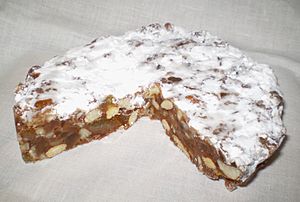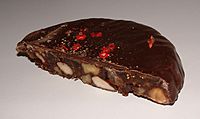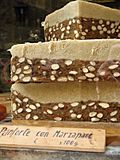Panforte facts for kids

Traditional style panforte
|
|
| Type | Confectionery |
|---|---|
| Place of origin | Italy |
| Region or state | Tuscany |
| Main ingredients | Nuts, honey, sugar, fruits, spices |
| Variations | Panpepato |
Panforte is a traditional Italian dessert that is chewy and full of fruits and nuts. It's a bit like a thick cookie or a fruitcake. This sweet treat is famous all over Italy, but it's especially a Christmas tradition in the city of Siena.
Contents
History of Panforte
Panforte has a long history, going back to at least the 13th century. It comes from the Tuscany region of Italy.
Early Records
Old papers from 1205, kept in Siena, show that a bread flavored with pepper and honey was given to monks and nuns. This was a kind of tax or payment they had to make. It was called panes melati et pepati.
What "Panforte" Means
The name "panforte" literally means "strong bread." This is because of its spicy flavor. At first, people in Siena called it "panpepato" (peppered bread). This was due to the strong pepper used in the recipe.
Original Ingredients
The first panforte was made with wheat flour, honey, and spices. It also included dried figs, jam, and pine nuts. Pepper was a key ingredient for its strong taste.
How Panforte is Made
Making panforte is quite simple. First, sugar is mixed with honey until it dissolves. Then, different nuts, fruits, and spices are added. Flour is also mixed in with everything.
Baking and Finishing
The whole mixture is baked in a shallow pan. Once it's ready, the round cake is dusted with icing sugar. Panforte that you buy in stores often has a band of rice-paper around its edge.
Enjoying Panforte
Today, many shops in Italy make panforte. Each shop often has its own secret recipe. People usually enjoy a small piece with coffee or a dessert wine after a meal. Some even like it with their coffee for breakfast!
The Siena Tradition
In Siena, many people believe that real panforte should have seventeen different ingredients. This is because there are seventeen Contrade (neighborhoods) within the city walls. Siena is often called the "panforte capital" of Italy.
Special Recognition for Panforte
In 2013, Panforte received a special award called "Protected Geographical Indication" (PGI). This means that Panforte from a certain area of Italy is recognized for its traditional quality. It helps protect the way it's made and where it comes from.
-
Panforte with marzipan at a shop in San Gimignano
See also
 In Spanish: Panforte para niños
In Spanish: Panforte para niños
 | Frances Mary Albrier |
 | Whitney Young |
 | Muhammad Ali |



